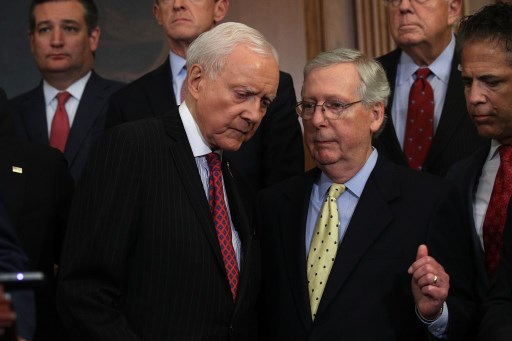
US congressional Republicans turned their focus to tax reform Wednesday, but they face a similar hurdle that doomed President Donald Trump’s failed efforts to repeal Obamacare: rebels within his own party.
With Trump still lacking a major legislative accomplishment in his first nine months in office, Republican leaders are hustling to pass tax reform by December.
The House of Representatives shifted from the disastrous health reform bid and launched into floor debate Wednesday on the 2018 federal budget that will lay out parameters for tax legislation that allows the 100-member Senate to pass it with a simple majority.
Republicans hold 52 Senate seats and, as with health care, they can afford just two defectors.
With federal debt soaring past $20 trillion for the first time last month, Republicans have warned of the need to return to fiscal sustainability.
But as a Senate budget panel began debating a comprehensive budget resolution, top Senate Democrat Chuck Schumer savaged the plan as fiscal recklessness.
Republicans, he warned, sought “to embark on a partisan product to cut taxes on the rich, raise them for the middle class and blow a huge $1.5 trillion hole in the deficit.”
The White House has argued that the tax proposal — which seeks deep cuts to corporate and individual tax rates and abolition of the inheritance or estate tax — would spur sufficient economic growth to neutralize the loss in tax revenue.
But a handful of Senate Republicans could derail the party’s long-held goal of tax reform, particularly if it unambiguously appears to decrease federal revenues.
“I just want to put a marker down there that I’m not interested in increasing our deficits,” Senator Bob Corker told reporters Tuesday.
“Count me out if it adds a penny to the deficit.”
Corker has criticized the president, and his recent announcement that he will not run for re-election in 2018 could free him to buck his party over taxes.
A ‘narrow’ path
Senator Susan Collins, who helped sink the Obamacare repeal, said she was eager to tackle tax reform, “but I have concerns about the estate tax and about bringing down the top rate by a substantial amount.”
Under the proposal, the seven existing tax brackets would be compressed to three, bringing the top rate down from 39.6 percent to 35 percent.
Even with the proposed elimination of personal exemptions, America’s wealthy would be rewarded a major tax break, many economists and tax groups say.
“Taxpayers in the top one percent would receive about 50 percent of the total tax benefit,” the non-partisan Tax Policy Center estimated.
It also projected a $2.4 trillion plunge in federal revenues over the first 10 years.
Senator Rand Paul sounded skeptical.
“This is a GOP tax plan?” the conservative Republican posed on Twitter, as he mused on the prospect that 30 percent of middle class families might face a tax hike.
“I hope the final details are better than this.”
No legislative text has been released yet. And as debate got under way, House Speaker Paul Ryan acknowledged that a fourth, higher tax bracket for the super-wealthy might be in the works.
Senator John McCain, whose “no” vote helped kill off health reform, has stressed that tax reform would be more successful if it were bipartisan.
With concern mounting, Republican leaders launched a full-court press to win over skeptics in the party.
“We’ve been talking to all of them,” number two Senate Republican John Cornyn told AFP. “The path is narrow but I’m optimistic about getting there.”
Democrats have solidly rallied against the plan, suggesting that at least in the Senate, Republicans will have to pass the legislation without any Democratic support.
“We beat the Trump health care scam twice, and we’re going to beat him a third time on his tax scam,” said Senator Ron Wyden.
© Agence France-Presse







